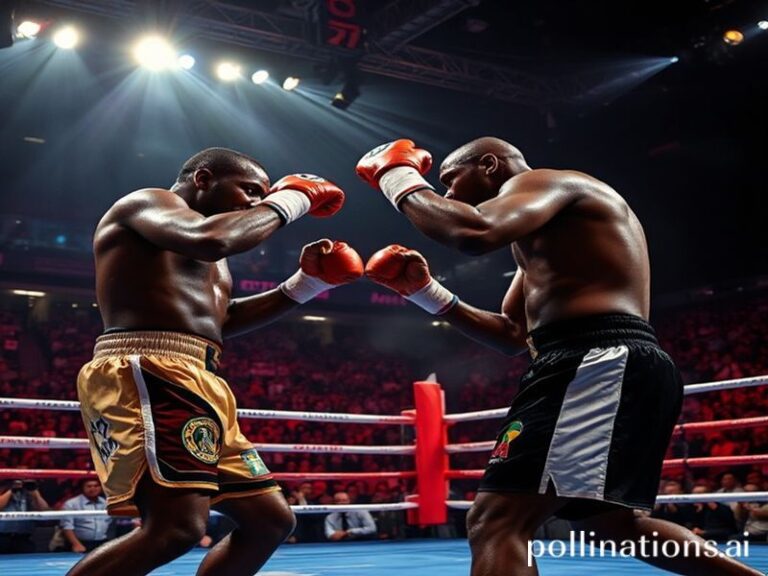Global Guessing Game: How Today’s Wordle Hints Became the Planet’s Last Shared Language
GENEVA—While the Doomsday Clock ticked to 89 seconds-to-midnight and oligarchs shopped for citizenship-by-investment, roughly one-eighth of humanity paused this morning to ask a single, burning question: does today’s Wordle contain a double letter? From Lagos lunch breaks to Seoul subway cars, from São Paulo favela Wi-Fi cafés to Luxembourg banking-firm open-plan serfdoms, the five-by-six grid has become our lingua franca—an Esperanto of procrastination. Somewhere, a Ukrainian bomb-shelter teacher dims her flashlight to conserve battery and still guesses “CRANE” first, because statistically it’s optimal and Russian artillery is not.
The United Nations measures gross domestic product, literacy, life expectancy—yet neglects to track the only metric that now unites us: global daily Wordle solve-rate. Independent statisticians (read: grad students avoiding thesis work) estimate 87 million attempts before 09:00 GMT alone, a number that dwarfs the combined circulation of the ten largest newspapers. If Wordle were a religion it would be the fastest-growing; if it were a country it would have more daily citizens than Germany and a military composed entirely of Twitter reply-guys armed with spoiler-free emoji.
Hints, therefore, are no longer idle crossword clues—they’re samizdat in the gray dictatorship of boredom. In Manila, call-center agents smuggle color-coded Post-its across cubicles like Cold-War microfilm: green square, yellow square, existential dread. Parisian waiters trade consonant intelligence for espresso shots; the hints travel faster than Omicron variants and mutate just as frequently, spawning splinter factions (hello, Quordle) the way Marxist cadres begat tankies and Trot dreamers.
International bodies have noticed. Brussels is drafting the Hint Transparency Initiative: any clue must be labeled according to carbon footprint and psychological warfare risk. Beijing’s censors briefly blocked “Wordle” after users noticed the solution on June 4 bore an unfortunate orthographic resemblance to “TANKS,” then quietly restored it when state media realized the game doubles as citizen surveillance—every guess is, after all, voluntarily typed into an American server farm. The NSA, flattered, reportedly tried to classify “ADIEU” as a foreign agent.
Economists insist the phenomenon is harmless. Yet central bankers from Ottawa to Wellington confess they delay interest-rate hikes until after lunch, fearing traders distracted by that precious penultimate row. The IMF is modeling a “Wordle Recession”: productivity loss equivalent to two Airbus factories, or one medium-sized conflict. Goldman Sachs already securitizes hint derivatives; odds on tomorrow’s word fluctuate like copper futures. If you think this is satire, check the ticker symbol WDLE—yes, it exists, trades on pure rumor, and your pension is probably long.
Anthropologists offer rosier interpretations: a shared ritual in an atomized century, the last campfire before the ecosystem finishes collapsing. One could almost find it touching—species circling the drain, still gifting one another gentle nudges: “Starts with S,” “No plural,” “Think emotion, not invasion.” A digital potlatch of vowels and consonants, proving we can still be generous when the apocalypse is sponsored by a crossword app the New York Times bought for couch-cushion change.
But darkness creeps in. Extremist forums weaponize hints, laundering coded messages inside seemingly innocent clues—“today’s word rhymes with BOMB” turned out not to be “COMB.” The Anti-Defamation League now maintains a list of hate-group starter words; apparently “ARISE” is innocuous, but “WHITE” is context-sensitive. Meanwhile, an arms race of solver-bots has emerged from the usual techno-dystopias; Russian and North Korean state hackers reportedly brute-force the daily answer at 00:01 EST, posting spoilers on Reddit for the sheer nihilistic glee of watching joy dissolve. If that isn’t a war crime, it should be.
Still, tomorrow we will rise, sip our ethically questionable coffee, and whisper the same prayer across time zones: four vowels, two syllables, no repeats. Because when the oceans are busy choosing which continent to erase next, there is something perversely heroic about caring whether strangers you’ll never meet will turn their final row green. Call it empathy by proxy, or simply the refusal to let algorithms steal the last 90 unmonetized seconds of our day.
And so, dear reader, here’s your truly international hint: the word won’t save you, but neither will the stock market, the election, or that meditation app you paid for and never opened. Guess wisely, share sparingly, and remember—every yellow square is just the universe’s way of saying “almost,” which, these days, feels almost like hope.







